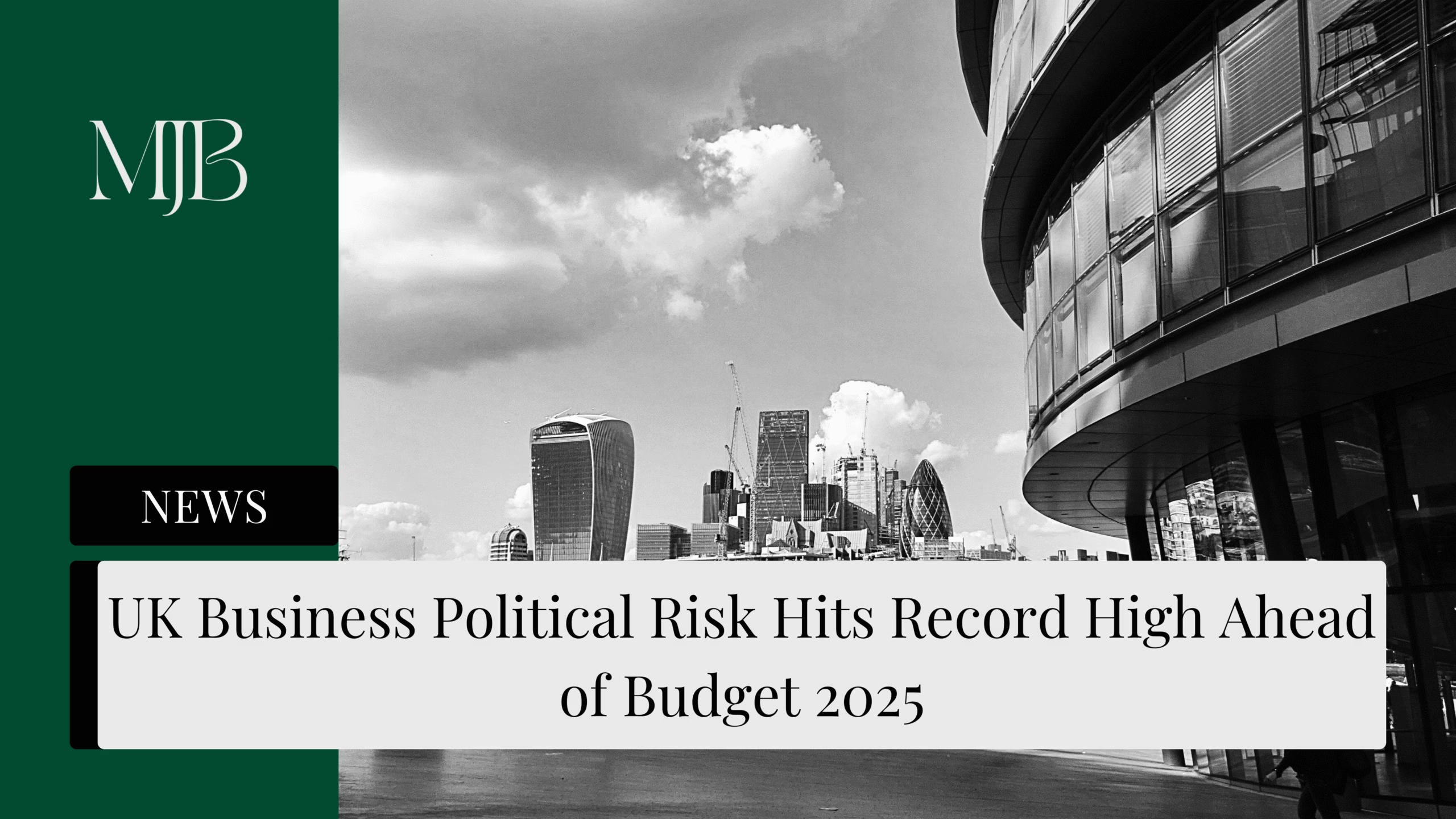How UK Business Political Risk Impacts Profitability
Here’s a stat that’ll wake you up: 85% of UK business leaders now say political risk is hammering their profitability. That’s a massive jump from 70% in January — signaling that UK business political risk has reached unprecedented levels.
With ongoing conflicts in Ukraine and the Middle East, plus Budget tax hikes hitting hard, UK firms are feeling serious pressure. National Insurance already jumped 1.2%, and with another Budget looming, political risk impact on business profitability is only getting worse.
Let’s break down how political risk is reshaping UK business strategy — and why it matters to anyone running or investing in a UK business right now.
Why UK Business Political Risk Is Spiking in 2025
According to Beazley’s latest survey on UK business political risk, we’re dealing with what Bethany Greenwood (their group head of specialty risks) calls “an unprecedented scale” of converging threats. Political shifts, economic wobbles, and global tensions aren’t just background noise anymore — they’re actively crushing business confidence.
Globally, political risk concerns are even starker. 88% of international leaders (up from 69% in January) believe political uncertainty is disrupting their trade. Translation? UK business political risk isn’t happening in isolation. It’s a worldwide crisis.
Supply Chains Are Getting a Makeover
When the ground shifts, smart businesses adapt. And adapt they are:
Supplier Shake-Ups
Nearly 90% of UK businesses plan to tweak their suppliers or supply chains due to geopolitical tension. That’s a massive leap from 72% earlier this year. Companies aren’t waiting around — they’re actively de-risking.
Rethinking Overseas Operations
Globally, 32% of firms are reviewing the security of their international operations (up from 23% in 2024). If you’ve got assets abroad, you’re probably asking: “How exposed are we, really?”
Inflation Still Lurking
Don’t forget inflation. 27% of global businesses cite it as a top concern, compared to 24% last year. It’s not gone — it’s just wearing a different hat.

UK Business Budget Impact: Growth Plans on Hold
86% of UK businesses say political uncertainty from Budget fears is dampening their growth ambitions. That’s up from 69% in January — a clear sign that UK business political risk is directly impacting expansion plans.
Translation? Expansion plans are on ice. Hiring freezes. Capital expenditure delays. The classic playbook when the fog rolls in.
But here’s the thing — uncertainty doesn’t mean opportunity is dead. It just means the playing field’s shifted.

The Silver Lining? Resilience Pays Off
Greenwood puts it well: “Firms that proactively reassess risks, embed resilience, and work with insurance partners can protect against shocks, move confidently, and capture growth in emerging tech, energy, and global markets.”
In other words, while others are paralyzed, the prepared can pounce. Emerging tech, energy transitions, and new markets are still ripe for those willing to navigate the chop.
What Should Businesses Do Next?
If you’re running a business right now, here’s your to-do list:
Audit your supply chain — Identify vulnerabilities and diversify where possible
Review your risk insurance — Political risk insurance isn’t just for multinationals anymore
Stress-test your growth plans — Build flexibility into your strategy
Stay informed — The full Beazley report drops in October (based on 3,500 global leaders). It’ll be worth reading.
The Takeaway
UK business political risk isn’t theoretical anymore — it’s a boardroom crisis. With 85% of UK businesses feeling the profitability pinch, and global tensions showing no signs of easing, the question isn’t if political risk will affect your business. It’s how prepared you are when it hits.
The Budget’s around the corner. Political uncertainty isn’t going anywhere. But with the right resilience strategies, UK businesses can still win despite political risk challenges.
FAQ
Q1: What’s driving the spike in political risk for UK businesses?
A: A combo of global conflicts (Ukraine, Middle East), tax hikes (National Insurance up 1.2%), and fears of more taxes in upcoming Budgets. Add in inflation and supply chain fragility, and you’ve got a perfect storm.
Q2: How are businesses responding to political uncertainty?
A: They’re reshaping supply chains (90% planning changes), reviewing overseas operations (32% globally), and putting growth plans on hold (86% in the UK). Diversification and de-risking are the new priorities.
Q3: Is political risk just a UK problem?
A: Nope. Globally, 88% of business leaders say politics is impacting trade — up from 69% in January. This is a worldwide trend, not a local blip.
Q4: Can businesses still grow despite political risk?
A: Absolutely. Firms that embed resilience, work with risk partners, and stay nimble can capitalise on emerging opportunities in tech, energy, and new markets. Uncertainty creates winners and losers — preparation is the difference.
Q5: When will the full Beazley report be released?
A: October 2025. It’s based on insights from 3,500 global business leaders and will offer deeper analysis on geopolitical and economic risk trends.
DISCLAIMER
Effective Date: 15th July 2025
The information provided on this website is for informational and educational purposes only and reflects the personal opinions of the author(s). It is not intended as financial, investment, tax, or legal advice.
We are not certified financial advisers. None of the content on this website constitutes a recommendation to buy, sell, or hold any financial product, asset, or service. You should not rely on any information provided here to make financial decisions.
We strongly recommend that you:
- Conduct your own research and due diligence
- Consult with a qualified financial adviser or professional before making any investment or financial decisions
While we strive to ensure that all information is accurate and up to date, we make no guarantees about the completeness, reliability, or suitability of any content on this site.
By using this website, you acknowledge and agree that we are not responsible for any financial loss, damage, or decisions made based on the content presented.






